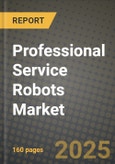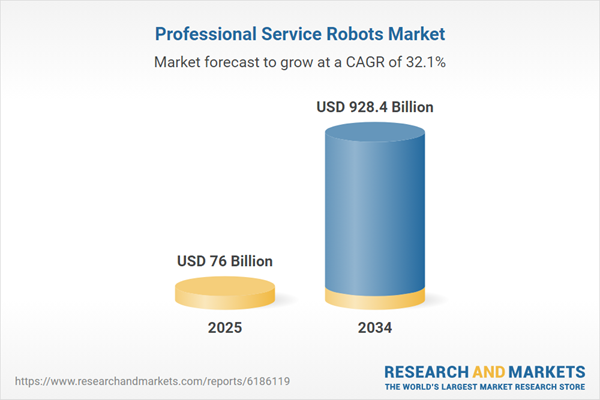Professional Service Robots Market Overview
The Professional Service Robots market is witnessing rapid growth as businesses across industries adopt automation to enhance efficiency, improve safety, and reduce operational costs. Unlike industrial robots, which are designed for manufacturing environments, professional service robots operate in sectors such as healthcare, logistics, retail, agriculture, and hospitality. These robots assist with tasks ranging from warehouse automation and medical surgeries to security patrolling and customer service interactions. The increasing integration of artificial intelligence (AI), machine learning, and advanced sensors is enabling professional service robots to perform complex, human-like tasks with high precision and adaptability. Rising labor shortages, growing demand for contactless services, and advancements in autonomous navigation are further accelerating market expansion. Governments and enterprises are investing heavily in robotics research and development (R&D), fueling innovation and increasing adoption rates. As industries continue to seek automation-driven solutions, professional service robots are expected to play a crucial role in transforming business operations.The Professional Service Robots market is experiencing significant technological advancements, particularly in AI-driven automation, 5G connectivity, and human-robot collaboration. AI-powered robots are becoming more autonomous, capable of learning from their environments, and making real-time decisions to enhance efficiency. The integration of 5G is enabling faster data processing and improved communication between robots, allowing for seamless coordination in logistics and healthcare settings. In retail and hospitality, robotic assistants are enhancing customer experiences by providing personalized services, guiding customers, and automating inventory management. The healthcare sector is witnessing a surge in robotic-assisted surgeries, rehabilitation robots, and AI-driven patient care systems that improve medical outcomes. Additionally, agricultural robots are being deployed for precision farming, automated harvesting, and pest control, helping address labor shortages and increasing food production efficiency. As industries increasingly rely on professional service robots, the market is witnessing rising investments in R&D, partnerships between robotics firms and AI developers, and government initiatives to promote automation.
The Professional Service Robots market is expected to advance with breakthroughs in AI, edge computing, and robotics-as-a-service (RaaS) models. AI will enable robots to develop higher levels of adaptability, allowing them to perform complex, multi-functional tasks with greater autonomy. Edge computing will enhance real-time data processing, enabling robots to make faster decisions without relying on cloud-based systems. The adoption of RaaS models will increase, allowing businesses to access robotic automation as a subscription service rather than making large upfront investments. Additionally, humanoid robots equipped with natural language processing (NLP) and emotion recognition capabilities will gain prominence in customer service and elder care. Sustainability will also play a key role, with the development of energy-efficient robots and eco-friendly materials used in robotic manufacturing. As robotics technology evolves, the market will continue to expand across new industries, offering scalable and intelligent automation solutions that redefine workplace efficiency and service delivery.
Key Insights: Professional Service Robots Market
- AI-Driven Autonomous Robots: Advancements in AI and machine learning are enabling professional service robots to learn from their environments, adapt to dynamic conditions, and perform complex tasks with minimal human intervention.
- 5G-Enabled Robotic Communication: The integration of 5G technology is enhancing real-time data transmission, enabling robots to operate with greater precision, faster response times, and improved coordination in industries like logistics and healthcare.
- Rise of Robotics-as-a-Service (RaaS): Businesses are increasingly adopting RaaS models, allowing them to deploy professional service robots on a subscription basis, reducing upfront costs and making automation more accessible.
- Human-Robot Collaboration (Cobots): Collaborative robots (cobots) are being designed to work alongside human employees, improving productivity in industries such as retail, healthcare, and hospitality.
- Sustainability-Focused Robotics Solutions: Companies are developing energy-efficient robots and using recyclable materials in robotic manufacturing to align with sustainability goals and reduce the environmental impact of automation.
- Labor Shortages and Rising Operational Costs: Businesses are turning to professional service robots to address workforce shortages, reduce labor costs, and increase efficiency in high-demand industries such as healthcare and logistics.
- Growing Demand for Contactless Solutions: The post-pandemic shift toward automation is driving adoption of service robots for contactless deliveries, self-service kiosks, and automated disinfection in public spaces.
- Advancements in AI and Sensor Technologies: Innovations in AI, machine vision, and sensor technology are enhancing the capabilities of professional service robots, enabling them to perform tasks with greater accuracy and intelligence.
- Government Support and Investments in Robotics: Governments worldwide are funding robotics R&D initiatives and offering incentives for automation adoption, fostering growth in the professional service robots market.
- High Initial Investment and Integration Costs: While professional service robots offer long-term efficiency gains, the high cost of acquisition, deployment, and integration with existing systems poses a challenge for small and mid-sized enterprises.
Professional Service Robots Market Segmentation
By Type
- UAV
- Unmanned Ground Based Vehicles
- Demining Robots
- Defense Robot
- Construction Robots
- Other Types
By Offering
- Hardware
- Software
By Application
- Oil and Gas
- Construction and Building
- Mining and Metallurgical
- Defense and Military
- Automotive
- Medical
- Logistics
- Other Applications
By End-use
- Residential
- Commercial
- Industrial
Key Companies Analysed
- Northrop Grumman Corporation
- Boston Dynamics Inc.
- Daifuku Co. Ltd.
- Aethon Inc.
- Electrolux AB
- Kuka AG
- iRobot Corporation
- Robert Bosch GMBH
- Elbit Systems Ltd.
- Gecko Systems International Corporation
- Yujin Robot Co. Ltd.
- Cyberdyne Inc.
- Ontario Drive & Gear Ltd.
- Softbank Robotics Group
- Ryonic Robotics
- Brokk AB
- Husqvarna Group
- Beijing Borui Intelligent Control Technology
- Honeybee Robotics LLC
- Pure Technologies Ltd.
- Hanool Robotics Crop.
- Diakont
- Conjet AB
- TopTec Spezialmaschinen GmbH
- ULC Robotics International Limited
- Giant Hydraulic Tech Co. Ltd.
- Intuitive Surgical Inc.
- JD.com Inc.
- Samsung Electronics Co. Ltd.
- SZ DJI Technology Co. Ltd.
- Kongsberg Maritime AS
- DeLaval International AB
- Exyn Technologies
- XAG Co Ltd.
- Diligent Corporation
Professional Service Robots Market Analytics
The report employs rigorous tools, including Porter’s Five Forces, value chain mapping, and scenario-based modeling, to assess supply-demand dynamics. Cross-sector influences from parent, derived, and substitute markets are evaluated to identify risks and opportunities. Trade and pricing analytics provide an up-to-date view of international flows, including leading exporters, importers, and regional price trends.Macroeconomic indicators, policy frameworks such as carbon pricing and energy security strategies, and evolving consumer behavior are considered in forecasting scenarios. Recent deal flows, partnerships, and technology innovations are incorporated to assess their impact on future market performance.
Professional Service Robots Market Competitive Intelligence
The competitive landscape is mapped through proprietary frameworks, profiling leading companies with details on business models, product portfolios, financial performance, and strategic initiatives. Key developments such as mergers & acquisitions, technology collaborations, investment inflows, and regional expansions are analyzed for their competitive impact. The report also identifies emerging players and innovative startups contributing to market disruption.Regional insights highlight the most promising investment destinations, regulatory landscapes, and evolving partnerships across energy and industrial corridors.
Countries Covered
- North America - Professional Service Robots market data and outlook to 2034
- United States
- Canada
- Mexico
- Europe - Professional Service Robots market data and outlook to 2034
- Germany
- United Kingdom
- France
- Italy
- Spain
- BeNeLux
- Russia
- Sweden
- Asia-Pacific - Professional Service Robots market data and outlook to 2034
- China
- Japan
- India
- South Korea
- Australia
- Indonesia
- Malaysia
- Vietnam
- Middle East and Africa - Professional Service Robots market data and outlook to 2034
- Saudi Arabia
- South Africa
- Iran
- UAE
- Egypt
- South and Central America - Professional Service Robots market data and outlook to 2034
- Brazil
- Argentina
- Chile
- Peru
Research Methodology
This study combines primary inputs from industry experts across the Professional Service Robots value chain with secondary data from associations, government publications, trade databases, and company disclosures. Proprietary modeling techniques, including data triangulation, statistical correlation, and scenario planning, are applied to deliver reliable market sizing and forecasting.Key Questions Addressed
- What is the current and forecast market size of the Professional Service Robots industry at global, regional, and country levels?
- Which types, applications, and technologies present the highest growth potential?
- How are supply chains adapting to geopolitical and economic shocks?
- What role do policy frameworks, trade flows, and sustainability targets play in shaping demand?
- Who are the leading players, and how are their strategies evolving in the face of global uncertainty?
- Which regional “hotspots” and customer segments will outpace the market, and what go-to-market and partnership models best support entry and expansion?
- Where are the most investable opportunities - across technology roadmaps, sustainability-linked innovation, and M&A - and what is the best segment to invest over the next 3-5 years?
Your Key Takeaways from the Professional Service Robots Market Report
- Global Professional Service Robots market size and growth projections (CAGR), 2024-2034
- Impact of Russia-Ukraine, Israel-Palestine, and Hamas conflicts on Professional Service Robots trade, costs, and supply chains
- Professional Service Robots market size, share, and outlook across 5 regions and 27 countries, 2023-2034
- Professional Service Robots market size, CAGR, and market share of key products, applications, and end-user verticals, 2023-2034
- Short- and long-term Professional Service Robots market trends, drivers, restraints, and opportunities
- Porter’s Five Forces analysis, technological developments, and Professional Service Robots supply chain analysis
- Professional Service Robots trade analysis, Professional Service Robots market price analysis, and Professional Service Robots supply/demand dynamics
- Profiles of 5 leading companies - overview, key strategies, financials, and products
- Latest Professional Service Robots market news and developments
Additional Support
With the purchase of this report, you will receive:- An updated PDF report and an MS Excel data workbook containing all market tables and figures for easy analysis.
- 7-day post-sale analyst support for clarifications and in-scope supplementary data, ensuring the deliverable aligns precisely with your requirements.
- Complimentary report update to incorporate the latest available data and the impact of recent market developments.
This product will be delivered within 1-3 business days.
Table of Contents
Companies Mentioned
- Northrop Grumman Corporation
- Boston Dynamics Inc.
- Daifuku Co. Ltd.
- Aethon Inc.
- Electrolux AB
- Kuka AG
- iRobot Corporation
- Robert Bosch GMBH
- Elbit Systems Ltd.
- Gecko Systems International Corporation
- Yujin Robot Co. Ltd.
- Cyberdyne Inc.
- Ontario Drive & Gear Ltd.
- Softbank Robotics Group
- Ryonic Robotics
- Brokk AB
- Husqvarna Group
- Beijing Borui Intelligent Control Technology
- Honeybee Robotics LLC
- Pure Technologies Ltd.
- Hanool Robotics Crop.
- Diakont
- Conjet AB
- TopTec Spezialmaschinen GmbH
- ULC Robotics International Limited
- Giant Hydraulic Tech Co. Ltd.
- Intuitive Surgical Inc.
- JD.com Inc.
- Samsung Electronics Co. Ltd.
- SZ DJI Technology Co. Ltd.
- Kongsberg Maritime AS
- DeLaval International AB
- Exyn Technologies
- XAG Co Ltd.
- Diligent Corporation
Table Information
| Report Attribute | Details |
|---|---|
| No. of Pages | 160 |
| Published | October 2025 |
| Forecast Period | 2025 - 2034 |
| Estimated Market Value ( USD | $ 76 Billion |
| Forecasted Market Value ( USD | $ 928.4 Billion |
| Compound Annual Growth Rate | 32.0% |
| Regions Covered | Global |
| No. of Companies Mentioned | 35 |








